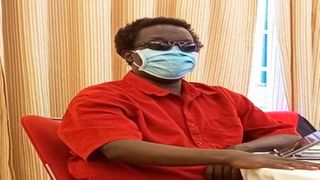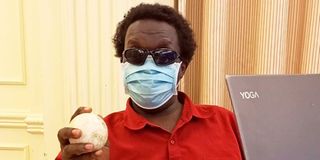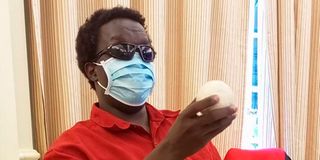
Paul Mugambi during the interview with the Daily Nation in Nairobi.
| Hillary Anekea | Nation Media GroupDN2
Premium
'I’m driven by the need to stand out as a blind person'
What you need to know:
- At 15, Paul Mugambi got caught up in a fight and was hit in the eyes. Wrong medication at the hospital cost him his eyesight.
- Now 39, he has spent all his life fighting for the rights of people with disabilities, and broken many records in the process.
“God created land with lakes and rivers for man to live. And the desert so that he can find his soul,” is a Tuareg proverb that describes the life of Paul Mugambi. Paul lived a relatively normal life as a child, enjoying everything childhood had to offer until life threw him into the ‘desert’.
“On 27th October 1997, 4:36 PM, I got caught up in a fight. I was hit in the eyes. At that moment, I saw all the colours in the world: blue, red, pink. I fainted and was rushed to hospital where I was given wrong medication.”
That medical mistake cost him his eyesight.
However, even with his sight gone, and the harsh realities of the ‘desert’ haunting him, he still found some peace out there. Over the years, he has built an impressive reputation as a public policy scholar, diversity and inclusion expert, first blind cricket player in East Africa, strategist, musician, mentor and leader.
Before life took an unexpected turn, and when his favourite colour was blue (it still is), Paul created the fondest memories of his youth. Even though he has spent most of his life in the capital Nairobi, he lived most of his childhood in Meru, Central Kenya. Like most people from his generation, he spent most of his childhood days outdoors touching whatever his hands could touch and going wherever his feet could take him.
“I was young, jovial and a little bit social. Back then, the entertainment scene was not like today, we used to swim in rivers, pick firewood, and eat wild fruits. There were quite several wild fruits. One of them was called lamwiria. They were tiny fruits that were either green or red.”
When he was not swimming in the murky waters of a river or munching on wild fruits, like most boys his age, he could not resist the urge to get himself into some mischief.
“In the village there was a lot of local brew, and we would be the ones who would alert others whenever the police were around. We were the ones being sent to tell other villagers that the police were coming. It was fun,” he says with a smile.
However, when tragedy struck that fateful evening in October, the good days became a mirage. He found himself alone.
“When it all happened, and I lost my eyesight, I lost my friends and networks. At that point, when you find yourself in isolation mode, you have to create a new space where you fight for yourself. I came to find out that no one will give you that space if you do not fight for it.”

Paul Mugambi displays the cricket ball he uses.
“What drives me is that I want to do better than any other person because when you operate like everybody else, you do not stand out. Society has set certain standards that persons with disabilities are supposed to meet. Therefore, when people underestimate you, you try and be the best.”
It would be unfair to talk about Paul’s quest for education without mentioning an interesting occurrence earlier on in life when he turned down donations that he viewed as belittling.
“There is a time, the national fund for the disabled was distributing equipment where they were giving people with disabilities tools for shoe repair. After the exercise was done, I was asked to give a vote of thanks because I was among the most learned in the group. When I stood to speak, I expressed my gratitude to them for supporting persons with disabilities, but I was keen to point out that I did not want shoe-making tools. I wanted to go to school, get a better education and become a better person in future,” he says with a smirk.
That evening, he received a thorough beating from his mum for “embarrassing her in public.”
With unrelenting zeal, Paul began his quest for success at Thika High School for the blind in 1997. While he was determined to do his best, in retrospect, he realises that being in a disadvantaged position attracted a lot of negativity even from people he expected to uplift him.
“Students in high school are usually bullied. When you grow up, you realise that you were being bullied. I remember there were teachers who used to tell us that we would not do anything meaningful with our lives.”
Luckily, he found a way to shield himself from the negative energy. He is quick to admit that his humble beginnings could not allow him to cave in to the bullying.
“What worked for me in that experience is that even if somebody wrongs you, use that as a motivation to do better. I used to disagree with the opinions that teachers and other students had formed about persons with disabilities. I used to sit down and ask myself: “Is it true that I might not go to university?”
Back home, most people with disabilities have never been to university, and most of them are entirely dependent on other people. I challenged myself to avoid that path.”
Visual impairment
Paul performed well and qualified to join university upon completing his secondary school education. He hoped to join the university of Nairobi to pursue his childhood dream of becoming a lawyer.
“I think the gender-based violence in my community spearheaded the determination to pursue law. I used to stay with my grandmother and she was my greatest influence. She used to tell me about how women were being treated, and how they tried to fight the system.”
Unfortunately, the university was not offering his desired course for persons with visual impairment at the time. With his dream to become a lawyer swept away, he decided that communication at Kenyatta University would be his safety net.
However, similar to the University of Nairobi, Kenyatta University was not offering the course for visually impaired persons at the time. His option hit a brick wall again.
“I was forced to do special needs education. Therefore, I enrolled for the course at Kenyatta University between 2002 to 2006. I am supposed to be a good secondary school teacher today, but I only taught up to teaching practice where I left to pursue other ventures.”
In 2016, he beat thousands of other applicants and was awarded a scholarship in Australia to pursue a master’s degree in public policy. He attributes this success to his leadership, exposure, and drive in life. He was the only person living with disabilities among the 40 people selected to join the program. He hoped to understand why policies for persons living with disabilities are not operational with this degree.
During his two and a half years stint in Australia, he dived into sports activities, including blind cricket, and tandem riding. He also won an excellence award for advocating for inclusion and was also elected by persons with disabilities to be their secretary. In the meantime, he continued with his dream of being on radio. He was part of a radio program in the university and a community radio program that he still contributes to, to date.
Paul’s journey in advocacy and leadership started earlier in life without him knowing. He admits that he has tried to run away from it when things get tough, but he always finds himself stuck in it.
“During my experience in Australia, I met with the Aboriginals (a group of indigenous people of Australia), and I tend to associate myself with them because of the way they have been marginalised and opportunities taken away from them.”
Some of the most notable strides he has made in advocacy started at the University. During his time as a student, people with visual impairment did not have braille books, and they had to depend on volunteers to read out things to them.

Paul Mugambi has fought hard for rights of persons with disabilities all his life.
He says that the fact that they passed their examinations is purely through God’s intervention. With the odds stacked against him, he joined other like-minded individuals to advocate for the rights of persons with disabilities.
“Some of the benefits persons with disabilities enjoy in universities today were initiated by us. For example, we pushed for policies that would later see persons with disabilities with grade C+ get university admission.”
During his time on campus, Paul tried his hand at music.
At this time, he teamed up with his music producer to start a radio station in the university hostels. Armed with a desktop (a particularly prestigious machine at the time), they locally assembled an assortment of equipment to actualise the dream. They used the radio station to campaign for various courses and also ran some educational programs.
Paul also participated in the constitutional review of Kenyatta University and later became the first congressperson in the new constitution. He also participated in the larger mainstream elections, where he came in second.
Besides, Paul founded sports for persons with disabilities. According to him, Sports for persons with disabilities were mainly played in primary and secondary schools. Therefore, he played a role in bringing awareness to the sports in university.
Paul feels that he spent more time fighting for other people’s rights than his rights despite all these achievements. There are times he found himself fighting alone. He says that not everybody was cut out for advocacy because his passion could move mountains, but that does not apply to everybody.
“There is this time; I had organised to go to the ministry of education to talk to the minister. We mobilised students living with disabilities to go and champion our rights. Surprisingly, only three of us showed up in a whole bus. When we got there, we were denied entry. Out of my ingenuity, I told the receptionist to inform the minister that our bus was full of students who could overrun the office. And just like that, we were let in to see the minister.”
After his undergraduate studies, he got involved in voluntary work to fight for the rights of persons with disabilities. During that time, he joined Blind and Low Vision Network, an organisation that provides services to persons with disabilities. He worked towards the inclusion of persons living with disabilities through advocating for job opportunities among other campaigns.
“When we used to be invited to forums, I would tell off some organisations that preached about the inclusion of persons living with disabilities in the workforce, yet they were not implementing these changes themselves.”
Later on, Paul joined Humanity and Inclusion (currently Handicap International) and worked in Daadab refugee camp for about eight years. During this time at the refugee camp, he advocated for employment for refugees living with disabilities, child protection, water access, health and other humanitarian ventures.
International awards
After he felt like he had achieved what he wanted, including top leadership, and had equally won international awards, including the Disability Human Rights Champion and Lifetime Achievement Award in 2013, and 2014 respectively, he joined the government. According to him, he opted to join the government to contribute to the country’s well-being.
Paul’s favourite musicians are Tanzanian Rapper Professor Jay and American singer-songwriter Stevie Wonder. He started singing in high school in a boys’ band called Sunshine. Later on in university, he also sang, especially during the cultural week. However, it was not until 2011 that he became entirely immersed in his music career. He says his music is not centred on seeking sympathy but highlighting various societal issues.
“My genre of music is BK Flavour-Blind Kenya/Bongo Kenya flavour. I can rap and sing. I have also tried out a little bit of afro-fusion. Besides, I also do blind dance according to my own style.”
“My music is centred on encouraging people to reduce ableism and promote inclusion for everybody.”
Paul is quick to note that the Kenyan music industry is not receptive to persons with disabilities.
“I remember I had composed a song about an artist and tried to reach out to them for a collaboration, but they did not get back.”
Despite these challenges, he is proud that he has made significant progress in his career.
“I think I am the only artist with disabilities who has done international videos abroad. I did two videos in Australia that have not been released because of marketing and promotion setbacks. I also did another in the United Kingdom; it is on YouTube.”
What does the future hold?
Paul wants to be the first Kenyan government adviser on persons with disabilities. He advises people not to give up on their dreams because of the challenges they are going through or lack of opportunities.
“Stop comparing yourself to others. You are who you are, and nobody else could be you even if they try. You are unique and beautiful. Nobody is you.”





